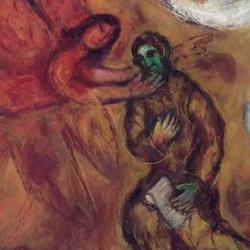INTRODUCTION
Early on, Isaiah sang a song of lament for Yahweh’s fruitless vineyard (Isaiah 5:1-7). As the “little apocalypse” ends, Isaiah records Yahweh’s song about His perpetual care for that same vineyard (27:2-6).
THE TEXT
“In that day the LORD with His severe sword, great and strong, will punish Leviathan the fleeing serpent, Leviathan that twisted serpent; and He will slay the reptile that is in the sea. In that day sing to her, ‘A vineyard of red wine! I, the Lord, keep it, I water it every moment; lest any hurt it, I keep it night and day.’ . . . ” (Isaiah 27:1-13).
A FRUITFUL VINEYARD
Four times in the chapter, Isaiah uses the phrase “in that day” (vv. 1-2, 12-13). These all describe the same moment, Yahweh’s restoration of Judah. That day will be a day of victory over the serpent (v. 1), the serpent that invaded and corrupted the garden/vineyard at the beginning. Yahweh is the Cherub who cuts the coiled dragon with His sword. The “vineyard” is Israel, and also Yahweh’s bride (Song of Songs 1:6; 8:11-12). In slaying the serpent, Yahweh is the True Adam who tends His bride, refreshing and guarding her day and night (Isaiah 27:3). All His wrath against His vineyard is spent (v. 4), and He turns His burning anger instead against the weeds that threaten to choke His vine (v. 4; cf. Isaiah 5:6; 7:23-25; 9:18; 10:17; Genesis 3:18). Because of Yahweh’s care and protection, the vineyard’s roots will go deep and it will produce fruit to fill the earth (Isaiah 27:6) with the wine of gladness (v. 2).
COVERED
Yahweh struck His vineyard; He slaughtered people from Judah. But that striking and slaughter is nothing compared to what He does to Judah’s enemies (v. 7). Yahweh disciples His people, but the discipline is neither as severe nor as permanent as His judgments against Israel’s enemies. He shooed them out of the land, “driving” them away like a husband sending away an unfaithful wife (cf. Isaiah 50:1; 54:5-8), like Adam and Eve driven from the garden (Genesis 3:23). But that separation is sufficient to cover Jacob’s iniquity. By suffering exile, Judah pays the full price for her sins (v. 9). To protect her from future temptation, He grinds idolatrous altars to powder (v. 9; cf. Exodus 32:20) and throws down the Asherah poles. The “fortified city” that attacked Judah will be desolated, a home to grazing cattle (v. 10). The tree of empire (cf. Daniel 4) that oppressed Israel be reduced to kindling gathered by women (v. 11).
HARVEST
On that day, Yahweh will complete the harvest. He will thresh to separate the wheat and chaff, and then bring the exiles home from the Euphrates in the north to the “brook of Egypt” in the south (v. 12). The word “flowing” that describes the Euphrates ( shibbol ) describes both a stream of water (Psalm 69:2, 15) and a head of grain (Genesis 41:5-7, 22-27). Here the two meanings are combined to create the image of a river of harvested grain flowing back toward the holy land. Yahweh pays particular attention to His people, as He gathers the grains “one by one” (v. 12). In Scripture, trumpets call people to worship (Numbers 10), echoing the great trumpet sound of Yahweh’s voice at Sinai (Exodus 19:16, 19; 20:18). Harvest leads to worship and festivity. Yahweh will gather the threshed grain of His people to make a great feast on the holy mountain (Isaiah 27:13). Vineyard and grain harvest: When all is said and done, Yahweh has filled the stores of His city with bread and wine.










